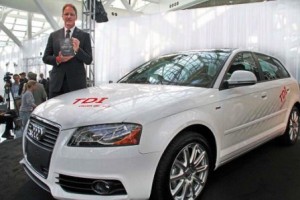
For the second year a diesel, this time the 2010 Audi A3 TDI, has won the Green Car of the Year award, held by the Audi of America CEO.
In a victory that carries clear political overtones, the Audi A3 TDI, a compact high-mileage diesel, was named Green Car of the Year during a ceremony at the Los Angeles Auto Show.
The German offering was up against four other hybrids and diesels in its bid for the increasingly coveted award. Jurors praised the Audi A3 not only for delivering high mileage and low-emissions but for its comfort, performance and features.
The award is clearly useful for Audi, which now has two so-called “Clean Diesels” in its line-up and which hopes to expand that line-up significantly, said Audi of America CEO Johan De Nysschen. Calling the award a “milestone,” the executive said the challenge Audi has faced is a “lack of awareness” of today’s diesels, which are vastly different from the slow, rough and smoke-belching oil burners” of decades past.
“People need to get out and drive a clean diesel model,” said Ron Cogan, editor of Green Car Journal, which sponsors the Car of the Year competition. Lot’s of people don’t understand how good an advanced diesel is. It drives just like any other car.”
The well-attended award ceremonies deliver more than just a trophy to the winners, helping provide both a marketing advantage and for diesel-makers, in particular, an opportunity to “help shape the discussion” about environmentally-friendly vehicles and the laws and regulations that will help direct that transformation.
While diesels now outsell conventional gasoline-powered vehicles in Europe, they’ve remained little more than an after-thought on the U.S. market. But, more problematic has been the opposition of some environmental groups and, in particular, the powerful California Air Resources Board, or CARB.
The agency has tightened diesel emissions standards significantly, in recent years, and is preparing to do so again. While diesel proponents believe they can comply, technically, they fear the financial burden of doing so might kill off the market entirely, even though diesels can boost fuel economy as much as 30% while also improving performance and towing capacity.
Coming a year after another diesel, the Volkswagen Passat TDI, was named Car of the Year, Green Car’s Cogan said “I hope,” that the award will begin to shift attitudes among regulators. If the primary goal is to reduce dependence on oil while also lowering emissions of global-warming CO2 gases, he said, the diesel has an important place.
“The government shouldn’t be focused on telling people what to drive but listening to what people want to drive,” Cogan said.
If Audi has its way, people will be driving a lot more diesels in the years ahead. De Nysschen told TheDetroitBureau.com that an A6 diesel is next in the line-up, and his goal is “to expand clean diesel technology to the rest of the (Audi) line.”

I have yet to find a study or article describing a comparison of particulate pollution from current ULEV gasoline cars to modern diesel cars. The fact that visible soot falls to the ground and does not enter lungs but invisible small particulates do is not mentioned when comparing diesel emissions to gasoline emissions. Gasoline cars do emit particulates but you would never know it from the literature, which I believe if patently biased against diesels, and is reflected in CARB and government proceedings. Gasoline still emits more CO, much more hydrocarbons (especially in refining and transport of the gasoline)and CO2/BTU than the more efficient and much less volatile diesel fuel. Biodiesel is made from renewable resources unlike gasoline, natural gas, coal, or nuclear, which all would be needed for creation of electricity to power the “new” electric vehicles proposed. We don’t need more or stricter regulations, just better, unbiased regulations.
What I mean is that CO2/BTU of power vs. heat energy expended is much better for diesel engines: more efficient combustion leads to less energy wasted, less CO2 pollution.